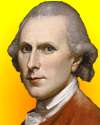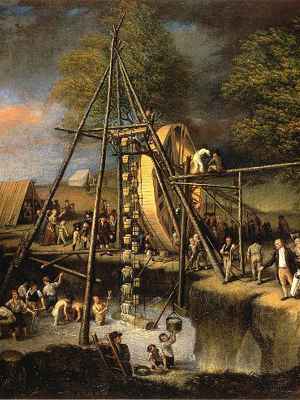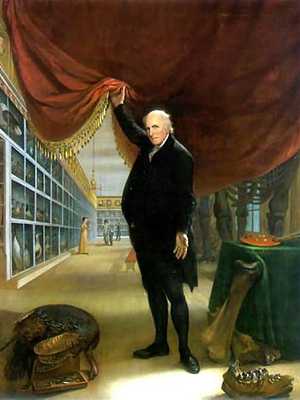 (source)
(source)
|
Charles Willson Peale
(15 Apr 1741 - 22 Feb 1827)
American artist and naturalist who opened the first U.S. popular Museum of Natural Science and Art. While a portrait painter, Peale also maintained a diverse interest in science, and held several patents for inventions.
|
The Peale Museum
by Charles Willson Peale
from a lecture on Natural History, at the University of Pennsylvania (1799)
[p.19] The world is a museum in which all men are destined to be employed and amused, and they cannot be too much interested in the objects around them. Goldsmith the elegant imitator of Buffon, says “The mere uninformed spectator passes on in gloomy solitude; while the naturalist in every plant, in every insect, and in every pebble, finds something to entertain his curiosity and excite his speculation.”
But it is only by order and system that a general view may be had of so extensive a subject, and that the great book of nature may be opened and studied, leaf by leaf, and a knowledge gained of the character which the great Creator has stamped on each being—without this, our desire would very soon be arrested by confusion and perplexity.
The credit of having first given natural history the form of system, is justly given to the celebrated Linnæus of Sweden ; to whom I am infinitely indebted for the present arrangement of my Museum.
I have long wished to be in a situation to point out to others, the various beauties which have [p.20] delighted me while in the pursuit of my unremitted labours for years; with the view of establishing a Public Museum.
The longest life is too short to accomplish the work I had undertaken; and foreseeing the risk, that my labours might be lost, I have hastened to put all I have been able to collect into such good preservation, as to insure their duration; and, by their arrangement, enable me to begin a course of lectures; which if I can accomplish, will infallibly stamp the proper value on the treasures of a museum. But knowing the difficult task which a lecturer has of profitably entertaining a number of pupils of various disposition, genius, and talents, I enter on it with the greatest diffidence: How well it may be executed, some few lectures will determine.
I have never had an opportunity of being present at such lectures; nor have had the advantage of perusing but a few books, on this subject; —therefore at least the arrangement of my lectures will be original; and I promise the friends of this pleasing study, that diligence shall not be wanting to procure the best means of information [p.21] in my power, to enable the friends of science who may favor me with their presence, properly to know the character of each subject; by pointing out the ingenious rules of art, observed for the fake of distinction. I shall use my best endeavours to give nothing false, and to explode error.
Since many of my audience may not know under what difficulties I have formed a Museum—permit me here to give a concise account of its rise and progress.—In speaking for a moment of myself, I hope I shall not be accused of the vanity of egotism.
For a number of years I followed the profession of a portrait painter; and by the labours of my pencil alone, supported a large family, and might have acquired a fortune; but, like many others of my countrymen, was more active for the public good, than solicitous of acquiring wealth.
At length I found it absolutely necessary to determine, whether to continue my political career, or leave it for the more peaceful studies of the fine arts: When the merit of each was put [p.22] in the balance, the peaceful muse outweighed political warfare—and since that period I have been scarcely so much as a common observer of the political world.
Leaving the walks of public life, I soon found leisure; and began to paint a collection of the portraits of characters distinguished in the American revolution—which may now justly be considered a valuable one.
I often view it with a pleasing pain, as it brings to my memory the agreeable converse of a Randolph, a Laurens, a Washington, a Green; the philosophic Franklin and Rittenhouse; and of the hair-breadth escapes of Decalb, Paul Jones, and Wayne, and the meritorious exertions and services of many others recognized in those monumental tablets.
From this digression I return to the subject—Having made some progress in the portraits of those worthies—my friend Col. Ramfey suggested the idea of amusing the public curiosity by putting into one corner of my picture-gallery, some bones of the mamoth, the enormous nondescript of America. Mr. Patterson (Professor [p.23] of Mathematics in our University) encouraged the plan, and presented me with the first article, a curious fish of our western waters, with which to begin my Museum.
From so small a beginning, arose a fabrick, which in some future day may be an honor to America.
Little did I then know of the labour I was bringing on these shoulders.—Tho’ I was called mad and cautioned to beware of the gulph into which many others of greater merit had fallen, —neglect and poverty,—yet so irrisistably bewitching is the thirst of knowledge in the science of nature that neither the want of funds, nor leisure from other occupations, could damp my ardour, tho’ a thousand difficulties rose in succession.
Foreigners are surprised to hear this is the work of an individual, unsupported by public bodies! yet it is a fact, which in future will scarcely be credited, that neither to the government of the United States, the state of Pennsylvania, nor any other state am I under the least obligation for the present appearance of the Museum. To individuals only, can I say I am indebted— [p.24] for whose numerous donations I shall ever be thankful.

Barber Farm, near Montgomery, N.Y.
painted by Charles Willson Peale
Curiosities which are accidentally acquired cannot be better disposed of than by putting them into a repository for the public inspection, where they may become immensely useful to thousands; otherwise, however valued at first, they are commonly shewn only to a few friends—the novelty subsides, and they are lost, or sent, as many have regretted, to Europe’s overflowing stores. The attention paid in the old world to collections of this nature, is a sufficient proof of their importance; where they are often the nurseries of the greatest scientific characters. It is to the Museum of a country, that travellers, after their more local and characteristic enquiries, should sedulously attend, in order to gain correct information on some of its most important peculiarities. Knowledge thus collected might often be the source of infinite benefit to their countrymen.—But in order that the benefit may be certain, every traveller should be acquainted with the products of his own, to enable him to enquire after and distinguish the peculiarities of other countries; and should particularly be acquainted with some kind of system, by which to [p.25] direct those enquiries; for it is only by method in collecting and storing our ideas, when a multiplicity is presented to us; that the knowledge of them is retained and rendered of service.
How often have 1 been surprised, in my Museum, to observe multitudes of my fellow citizens not even acquainted with the most common and valuable productions of our country!
If the labours attending my Museum will have the effect of making general this necessary acquaintance, in remarking the benefit which must follow to the public, I shall feel no inconsiderable reward.
I here publicly, and with earnestness, solicit the countenance and aid of the several professors, belonging to this honorable institution, the University of Pennsylvania.
Natural history, is a branch of science which particularly falls under the jurisdiction of our professors of philosophy; and although both in Britain and America but little attended to in schools for the instruction of youth, yet it is one of the most important studies to be instilled upon.
[p.26] Here, where the tender minds of youth receive their first and strongest bias—where they are taught to be wise, virtuous and happy—such an impression must have very great influence on their succeeding habits.
It is in the important and honorable office of pastors, teachers and professors, each in their respective modes of diffusing knowledge, that we must confide, for forming the minds of rising generations.—May they, in the pursuit of their arduous talk, meet with success, honor and reward.
Having thus attempted to explain the nature of the subject which is to be the ground-work of my future lectures, with a desire to impress on the minds of my fellow citizens a just idea of its importance, with the pleasing, hope, that my exertions, if not immediately, may ultimately tend to the PUBLIC GOOD;—
Permit me to conclude this address with a few lines of quotation from doctors Priestly and Enfield.
“Of scientific pursuits (says the philosophic [p.27] Priestly) the most liberal, the most honorable, the happiest, and what probably will be the host successful employment for a man in easy circumstances, is the study of nature; and therefore to this important object a principal attention should be given in educating youth who have the means of applying to these instructive and comfortable pursuits. Every man finds vacant moments from his ordinary business, which cannot be better filled than by such attentions as lead to the improvement of his understanding and elevate his mind to admire more and more, the astonishing works of the Creator, and thus is real religion befriended.
All the arts—from whence is derived whatever tends to the security and comfort of mankind, depend upon the knowledge of the POWERS OF NATURE; and the only possible way of acquiring and increasing the conveniences and comforts of life, of guarding against inconveniences and vexations, to which all are subject, and of enlarging the powers of man, is through a further acquaintance with the powers of nature.”
Doctor Enfield, in a discourse on the works [p.28] of God, makes philosophy and religion combine to exalt the character of the Creator; and he concludes with exhorting you, to study the works of nature for a higher purpose than merely to furnish you with an amusing, employment for your leisure hours, or with topics of entertaining conversation.
“Let philosophy conduct you to the temple of religion: contemplate the objects and productions of nature, as, the great. and marvelous works of Almighty God: Let the contemplation confirm your faith in his being, and providence, exalt your conceptions of his nature, and lead you to look up to him without superstitious terror; and approach him without fanatical familiarity, or mystical enthusiasm; but at all times you will think and speak of him, and adore and worship him with reverence as the first of all Beings.”
- Science Quotes by Charles Willson Peale.
- 15 Apr - short biography, births, deaths and events on date of Peale's birth.
- Mr. Peale's Museum, by Charles Coleman Sellers. - book suggestion.





